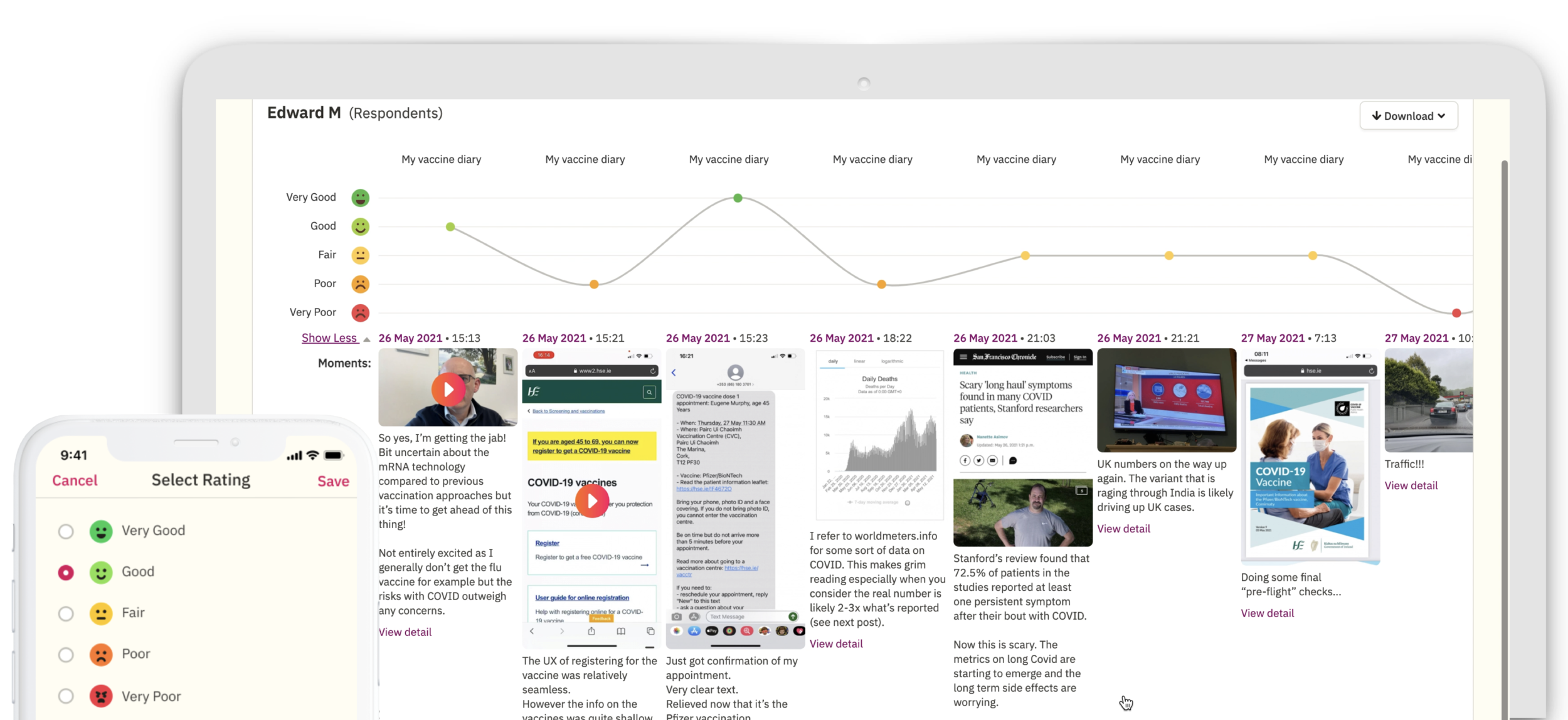Patient Journey Mapping as a tool for Healthcare Research
Patient journey mapping has become an indispensable tool in healthcare research, enabling brands and researchers to gain profound insights into the experiences of patients and caregivers. As traditional research methods face challenges with accessibility and scalability, mobile ethnography has emerged as a powerful, innovative approach to understanding patient experiences in real-world settings.
Mobile Ethnography as a tool for patient journey mapping
Mobile ethnography empowers researchers to design tasks and activities tailored to patients’ unique circumstances. By utilising longitudinal symptom diaries or "a week in the life" studies, patients capture rich data through photos, videos, screen recordings, and written notes detailing symptoms, diet, and treatment regimens. This method not only provides researchers with more nuanced insights compared to traditional approaches like focus groups or in-depth interviews but also fosters a more authentic understanding of patient experiences.
One of the key strengths of mobile ethnography lies in its longitudinal nature. Over time, researchers build trust and rapport with patients, encouraging them to share deeper, more revealing insights. This authentic connection enhances the reliability of the data collected, offering unparalleled perspectives into the patient’s journey.
What is Patient Journey Mapping in Healthcare?
Patient journey mapping examines the various touch points a patient encounters throughout their healthcare experience. This includes everything from disease diagnosis to treatment interactions and engagements with healthcare providers. By mapping the patient journey, researchers and brands can uncover:
How patients experience pain, symptoms, and the effects of treatments over time.
Key moments of frustration or satisfaction within the patient journey.
Opportunities for enhancing telehealth or omnichannel healthcare experiences.
Visual responses, such as photos and videos, bring these journeys to life. Additionally, tools like rating systems allow patients to quantify their experiences, offering a graphical representation of highs and lows. This data helps organizations craft more resonant messaging, improve patient outcomes, and design interventions that truly align with patient needs.
Journey Mapping Tips and Best Practices
Define Clear Objectives: Establish what you aim to understand or improve in the patient journey. Whether it’s identifying pain points in the treatment process or assessing the effectiveness of a new digital health tool, clear goals will guide your research design.
Focus on Empathy: Put yourself in the patient’s shoes. Understand their emotions, motivations, and frustrations. Design tasks that encourage them to share these openly.
Leverage Technology: Use tools like mobile ethnography platforms to enable patients to document their experiences in real-time. This not only minimises recall bias but also captures authentic moments.
Iterate and Refine: Regularly review the data being collected and make adjustments to tasks as needed. This iterative approach ensures that the research remains aligned with objectives and uncovers actionable insights.
Combine Quantitative and Qualitative Data: Use rating systems alongside video and photo diaries to capture both measurable and narrative insights. This comprehensive approach provides a richer understanding of the patient experience.
Patient Journey Mapping using Mobile Ethnography
Using the Journey Mapping features in research platforms like Indeemo, Mobile ethnography enables researchers to gain the same benefits of in-depth in-person observations, but from the comfort of the patient’s own home, and without the need for the researcher to be physically present. You are thus able to generate patient insights in a more efficient, safer and more cost-effective way than traditional approaches.
The Indeemo App offers a range of different possibilities, for example, patients can use the rating capability to capture ratings on a 5 point scale quantifying their pain levels or experiences at different moments.
Moderators can interact with patients and respondents privately (again in a contactless manner) using push notifications.
Finally, as a researcher, all the data is collated on an insights dashboard including the video-rich footage so you can see the results in real-time.
Indeemo: Facilitating Patient Journey Mapping
Indeemo’s mobile ethnography platform is an ideal solution for healthcare researchers aiming to map patient journeys effectively. With its comprehensive suite of features, Indeemo allows researchers to:
Design Tailored Tasks: Create personalized activities that encourage patients to document their experiences through photos, videos, and written reflections.
Capture Real-Time Insights: Patients can use their smartphones to record authentic moments in their own environments, offering a deeper understanding of their daily lives.
Utilize Rating Capabilities: The Indeemo app’s rating system enables patients to quantify their pain levels or experiences, providing a valuable layer of data for analysis.
Ensure Secure and Private Communication: The platform facilitates one-on-one interactions between researchers and patients through secure push notifications, fostering a sense of privacy and trust.
Streamline Data Analysis: Indeemo’s insights dashboard consolidates all data—from videos to ratings—into an intuitive interface, allowing researchers to view and analyse results in real-time.
By integrating these capabilities, Indeemo empowers healthcare researchers to gain unparalleled access to patient experiences, enabling them to make data-driven decisions that enhance patient outcomes and improve healthcare delivery.
Benefits of Mobile Ethnography for Patient Journey Mapping
Remote and Flexible: Mobile ethnography eliminates the need for in-person interviews, enabling research to be conducted remotely and on the patient’s schedule.
Private and Secure: Patients feel more comfortable sharing sensitive health-related information through private, self-recorded videos than in traditional clinical settings.
Longitudinal Insights: The approach captures data over extended periods, allowing researchers to identify trends and patterns in patient experiences.
Authentic Data Collection: By documenting their experiences in real-time, patients provide unfiltered, natural responses that offer a true reflection of their journey.
Conclusion
Patient journey mapping, powered by mobile ethnography, is transforming healthcare research. By leveraging tools like Indeemo, researchers can uncover authentic, actionable insights that improve patient experiences and outcomes. As brands and healthcare providers continue to seek deeper connections with their audiences, mobile ethnography offers a pathway to understanding patients’ journeys in a meaningful and impactful way.
Private, safe and secure
Private: we connect you 1-1 with research participants to maximise privacy and trust.
Safe: anonymnous respondent logins and segregated recruiter accounts minimise PHI
Secure: our platform has been independently vetted by large healthcare providers.
GDPR Compliant
ISO 27001 Certified
Enterprise Ready
HIPAA Compliant


